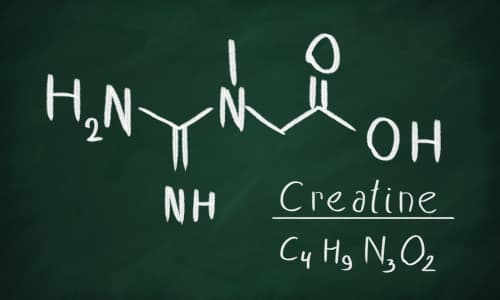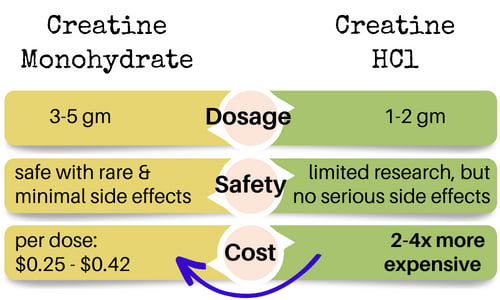Creatine HCl vs Monohydrate Supplements
“Creatine HCl vs Monohydrate Supplements” was written by Irene Mejía, RD, CPT & edited/reviewed by Aly Bouzek, MS, RDN.
If you are a fitness enthusiast, or even an advanced athlete, you’ve likely heard of creatine.
Creatine is a naturally occurring compound that is found in food, and through supplementation. Our bodies also naturally produce it.
Creatine is mostly stored in our muscles and helps increase muscle strength, size, and performance. This is one of the reasons why it is one of the most well-known fitness supplements.
However, creatine is not just for those who work out – it also has health benefits.
Let’s compare two popular forms of creatine supplements – creatine HCl vs monohydrate. From there, we can help you determine which one is best for you.
What is Creatine?

Creatine is a naturally occurring compound found mostly in muscle tissue, and it plays a vital role in energy production.
The liver, kidneys, and pancreas produce creatine.
Creatine comes from three amino acids (the building blocks of protein): glycine, arginine, and methionine. (1)
However, it technically isn’t a protein.
Creatine helps with energy production because it serves as a substrate to create another molecule called ATP (adenosine triphosphate). We know all of this may sound like a mouthful, so let’s explain it in a little more detail.
From Food to ATP
Our bodies need energy to keep us alive and to help us complete our daily activities. And as you may know, we get our energy from food.
Food is broken down into smaller parts through many chemical reactions, until it leads to a molecule called ATP. ATP is the primary source of energy for muscle contractions (which occur a lot when you exercise).
Think of this ATP molecule as storing money in a bank. ATP stores energy you get from your food. When your cells need the energy (for example, when exercising), it can withdraw the energy it needs.
Creatine comes into play by participating in some of those chemical reactions to help create the ATP molecule. (2)
However, the body’s natural production of creatine is limited. This is why creatine supplements have become increasingly popular among athletes and fitness enthusiasts.
Think about it: with more creatine in your body, the more ATP you produce, the more “stored” energy you have, and the more energy your muscles can “withdraw” when you exercise.
More energy could result in increased athletic performance, muscle mass, and strength. (3)
As mentioned in the previous section, creatine is stored mostly in the muscles. The idea is to consume creatine until you saturate these muscle stores, and then continue consuming creatine to maintain those levels.
What is Creatine Monohydrate?
Creatine monohydrate is the most commonly used and studied form of creatine supplement. It is made up of a creatine molecule and a water molecule, and is typically sold in powder form.
It is a white, odorless, crystalline powder that is water-soluble. You can mix creatine monohydrate in water, drinks, or protein powders.
Studies have shown that creatine monohydrate supplementation is effective in improving athletic performance, strength, and lean body mass, particularly when combined with resistance training. (3,4)
Dosage
Since this is a supplement heavily used by athletes, it is common to recommend a loading phase of 20–25 grams per day for the first 5–7 days, followed by a maintenance phase of 3–5 grams per day. (5)
Indeed, this loading phase saturates the muscle faster. However, the most common reported side effect of creatine monohydrate is bloating and digestive issues, and these mostly occur during a loading phase.
Considering that most of us are fitness enthusiasts and not advanced professional athletes, we very likely do not need a loading phase.
Therefore, by consuming from the start, 3–5 grams per day, our muscles will be completely saturated over the course of a month. This could prevent the undesired side effects of a loading phase. (5)
Safety
Creatine monohydrate is one of the most heavily researched supplements.
In general, it is considered safe for most individuals when taken within the recommended dosage guidelines. However, potential (but rare) side effects may include digestive issues, muscle cramping, and dehydration. (6)
In terms of neuroprotective effects, we need more research to determine if creatine is beneficial. There are a few current studies on this topic, but a final verdict on creatine supplementation benefiting neuroprotective effects is not yet available.
Now that we covered creatine monohydrate, let’s learn more about creatine HCl.
What is Creatine HCl?
Creatine HCl, or creatine hydrochloride, is a newer form of creatine supplement. It has been claimed to have improved solubility and absorption compared to creatine monohydrate.
(We will explain this claim in more detail in the next section).
Creatine HCl is made up of a creatine molecule and a hydrochloride molecule, and is typically sold in capsule form or powder form.
Currently, creatine HCL is not more effective than creatine monohydrate. (7)
However, some individuals may choose to use creatine HCL due to potential benefits such as the ability to take a lower dose, no loading phase required, and less bloating, but we will also explain this more in depth in the following section.
Dosage
Since it is a less studied supplement as opposed to creatine monohydrate, the exact recommended dosage is not as clear.
Most manufacturers recommend taking 1–2 grams of creatine HCL per day for maintenance, although dosages may vary depending on individual goals and tolerance.
Safety
There is also limited research available on the safety of creatine HCL, but overall it doesn’t seem to have serious adverse effects in most people. (8)
As with any dietary supplement, it is important to talk with your doctor or a registered dietitian before starting a supplement.
Creatine HCl vs Monohydrate Differences
Now that we have covered these two supplements individually, let’s summarize the main differences.
Solubility and Absorption
One difference between creatine HCl vs creatine monohydrate is their solubility and absorption. However, this difference may be negligible. Let’s cover why.
Creatine HCl is more soluble in water, than creatine monohydrate, due to its acidity from the hydrochloride.
So, if you dissolve creatine HCl and creatine monohydrate in a glass of water, creatine HCl will be more soluble while creatine monohydrate will likely leave a sediment.
However, we need to remember that our stomachs have hydrochloric acid, and acids increase the solubility of creatine monohydrate. (8)
When both types of creatine reach the stomach, it is very likely that there won’t be any significant differences in solubility or absorption.
Dosage
Another difference between creatine HCl vs monohydrate is their dosage. Creatine HCl is often marketed as being more “potent” than creatine monohydrate. This means that you need a smaller dose to achieve the same benefits.
For example, a typical daily dose of creatine monohydrate is 3–5 grams, while a daily dose of creatine HCl is usually between 1–2 grams.
But, as we will see in the following section, this becomes less relevant when we compare the costs.
Cost
The most drastic difference between the two types of creatine is their cost. In fact, the effective amount of creatine HCl per dose can be 2–4 times more expensive than creatine monohydrate.
Of course, keep in mind that pricing varies between brands, and it also depends on the dosage you need.
We have compared two common brands:
- Beyond Raw® Chemistry Labs™ Creatine HCl
- GNC Pro Performance® Creatine Monohydrate
Each dose of the HCl brand costs $0.41, while each effective dose of creatine monohydrate ranges from $0.25 for 3 grams to $0.42 for 5 grams.
Another brand of creatine HCl, CON-CRET® Patented Creatine HCl® Powder, has 750 mg of creatine HCl per serving, and it has 64 servings. However, that may not be an effective dose.
If we multiply 750 mg by two, then we end up with a dose of 1.5 grams, which is considered an effective dosage. With this, each serving ends up costing $1.09.
Safety
Creatine monohydrate is the most studied supplement. Creatine monohydrate supplementation is not only safe, but likely beneficial in terms of injury prevention and even for select medical conditions when taken within recommended guidelines. (1)
Additionally, there is no research suggesting that the short or long-term use of creatine monohydrate has detrimental effects on otherwise healthy individuals. (1)
However, this is not as clear for creatine HCl. So far, no serious detrimental effects have been reported after consuming creatine HCl, but the safety of creatine HCl cannot be guaranteed until more research is done.
Creatine HCl vs Monohydrate Supplement Comparison

Creatine HCl vs Monohydrate: How to Choose
Ultimately, the choice between creatine HCL vs monohydrate will depend on your individual needs and preferences.
If your concern is effectiveness, the authors of a study published in 2020 concluded that creatine HCl does not seem to be a more effective source of creatine than creatine monohydrate. (9)
If your concern is the dosage (and you want to consume smaller amounts of creatine), creatine HCl is a better alternative since most servings are smaller than creatine monohydrate.
If your concern is cost or safety, then creatine monohydrate supplements are the safest and most affordable option.
Creatine HCl vs Monohydrate FAQ #1: Can I Take Creatine With Protein Powder?
The International Society of Sports Nutrition indicated that adding carbohydrates or carbohydrates and protein to a creatine supplement seems to enhance the retention of creatine in muscles. (1)
This means that you could mix your creatine powder with your protein powder (like whey protein), or you could have a creatine capsule with a meal.
However, this may not necessarily result in greater performance improvements compared to using creatine monohydrate alone.
Creatine HCl vs Monohydrate FAQ #2: Will Creatine Cause Me to Gain Weight or Retain Water?
Some of the most common concerns about creatine are weight gain and water retention.
So far, most of the research says creatine does not change total body water (either inside or outside the cells) relative to muscle mass over longer periods of time.
But if you are still on the fence, we wrote an article called Does Creatine Make You Gain Weight?, where we explain this more in depth.
Creatine HCl vs Monohydrate Supplements Summary
There are so many workout supplement options, but creatine is one of the most effective.
Overall, both creatine HCl and creatine monohydrate are effective forms of creatine supplementation for increasing muscle mass, strength, and performance.
While there are some differences between the two, the most important factor is choosing a form that fits your preferences, needs, and lifestyle (think: cost, safety, and dosage).
With proper usage and safety considerations, creatine supplements can be a valuable addition to any workout routine.
It is important to note that creatine supplementation is not a magic solution and should be combined with a proper diet and exercise regimen for optimal results.
Additionally, you need to consult with a healthcare professional before starting any new supplement regimen.
